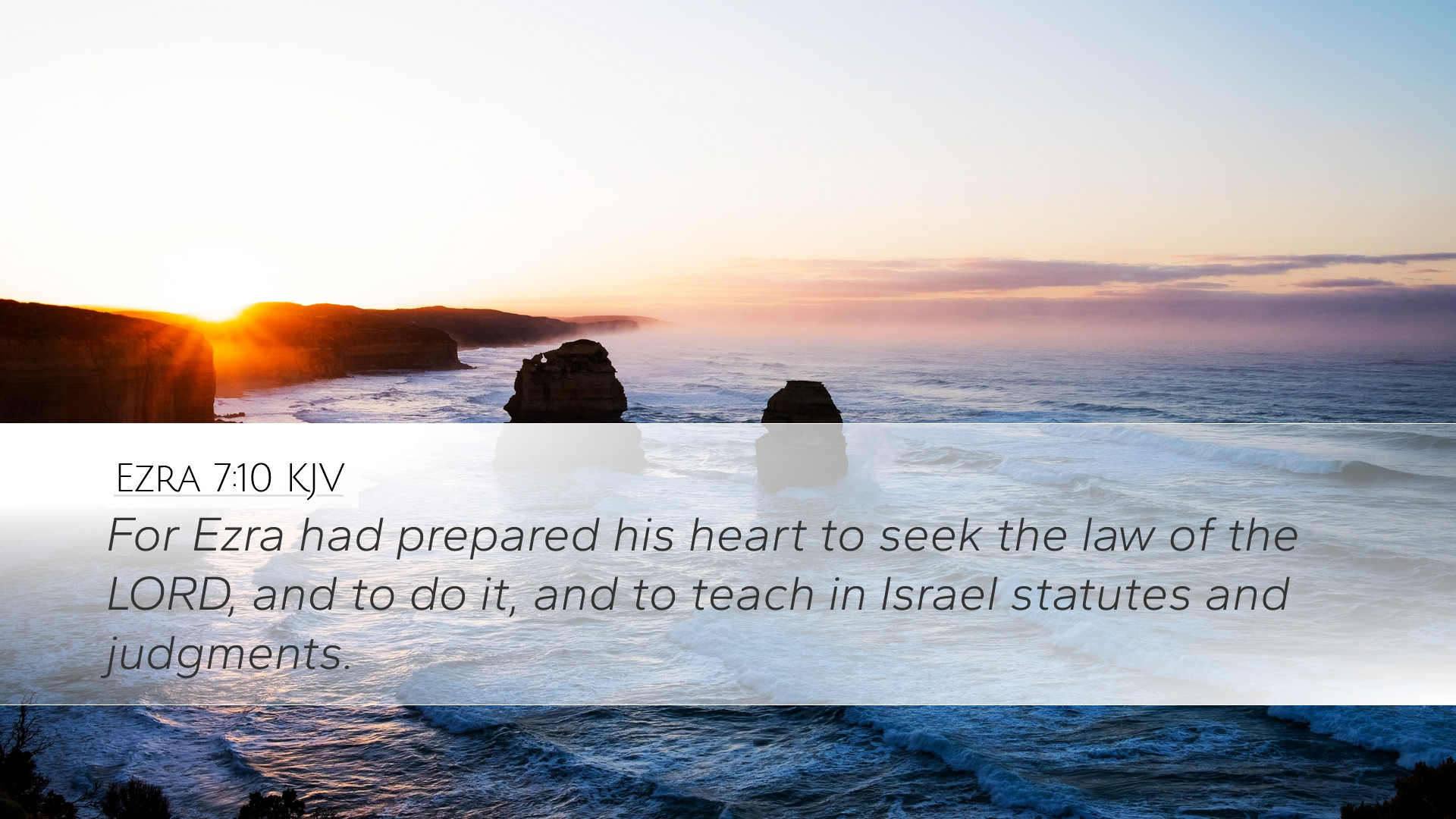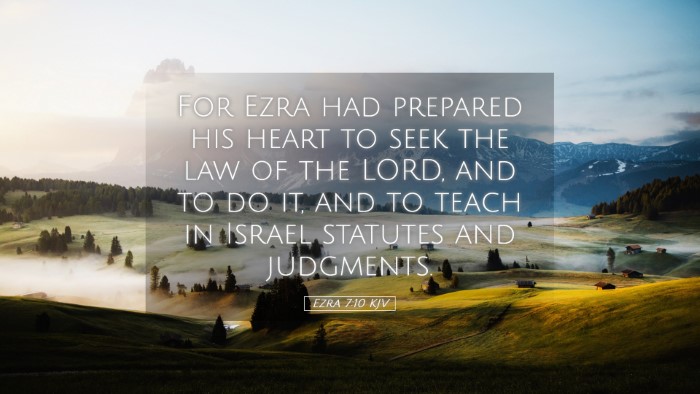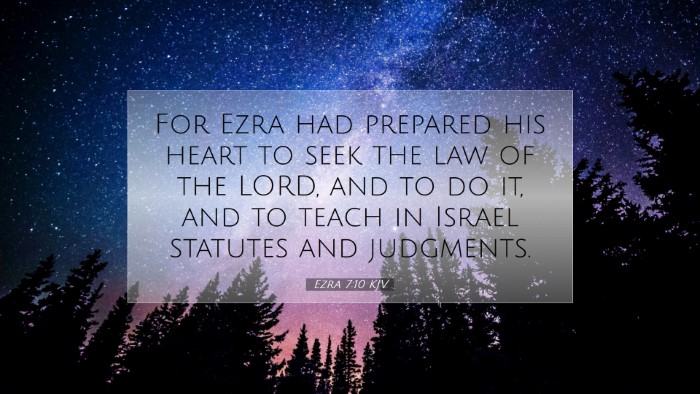Old Testament
Genesis Exodus Leviticus Numbers Deuteronomy Joshua Judges Ruth 1 Samuel 2 Samuel 1 Kings 2 Kings 1 Chronicles 2 Chronicles Ezra Nehemiah Esther Job Psalms Proverbs Ecclesiastes Song of Solomon Isaiah Jeremiah Lamentations Ezekiel Daniel Hosea Joel Amos Obadiah Jonah Micah Nahum Habakkuk Zephaniah Haggai Zechariah MalachiEzra 7:10
Ezra 7:10 KJV
For Ezra had prepared his heart to seek the law of the LORD, and to do it, and to teach in Israel statutes and judgments.
Ezra 7:10 Bible Commentary
Bible Commentary on Ezra 7:10
Verse: Ezra 7:10 - "For Ezra had prepared his heart to seek the Law of the Lord, and to do it, and to teach in Israel statutes and judgments."
Introduction
The verse stands as a significant testament to the character and mission of Ezra, a scribe and priest deeply dedicated to God's Word. This commentary seeks to draw from the insights of public domain commentators such as Matthew Henry, Albert Barnes, and Adam Clarke, providing a multifaceted understanding of Ezra's resolve and its implications for ministry and scholarship in contemporary settings.
1. Prepared Heart
Ezra's preparation of heart is pivotal. Matthew Henry emphasizes that to prepare one’s heart is to fortify oneself with a determination to align with God's will. This preparation denotes a thorough inner commitment that is essential for anyone who wishes to engage meaningfully with Scripture.
- Spiritual Discipline: A heart prepared requires conscious spiritual discipline. As Albert Barnes notes, diligent study of the Law implies an active engagement, setting an example for readers and preachers alike.
- Intentionality: Adam Clarke points out that such preparation is not passive; it involves deliberate action. This challenges modern pastors and theologians to consider the gravity of their heart conditions and the intent behind their pursuit of knowledge.
2. Seeking the Law of the Lord
Ezra’s commitment to seek the Law reflects a deep yearning for understanding the divine will. This pursuit extends beyond mere academic inquiry; it is a spiritual quest designed to bring the believer closer to God.
- Holistic Engagement: Henry remarks on the holistic nature of seeking God’s Law, suggesting that it encompasses not just intellectual pursuit but also emotional and relational dimensions.
- Understanding and Obedience: Barnes adds that seeking involves not only a desire to understand the principles contained within but also the earnest intention to apply them in one’s life. This correlates with James 1:22, urging believers to be doers of the word.
3. Doing the Law
Ezra did not stop with seeking; he committed to doing what he learned. This aligns with the biblical call to abide by God’s commandments and principles. Clarke highlights that practical obedience distinguishes genuine faith.
- Faith in Action: Obedience is the fruit of a prepared heart and diligent seeking. It confirms the authenticity of one's faith and serves as a testament to others in the community.
- Transformative Power: The act of doing brings about personal transformation, which Henry notes as essential for leaders who instruct others. It establishes a powerful witness to the validity of God's Law.
4. Teaching in Israel
The conclusion of the verse emphasizes Ezra’s role as a teacher. This responsibility carries significant weight as it shapes the spiritual direction of a nation.
- Leadership through Teaching: Both Henry and Barnes emphasize the calling of leadership to be deeply rooted in thorough understanding and personal practice of God’s statutes.
- Community Impact: Teaching is not merely a transfer of knowledge; it is a life-altering process. Clarke suggests that effective teaching will invoke reverence for God’s Word and result in societal transformation.
5. Statutes and Judgments
The terms ‘statutes and judgments’ indicate the comprehensive nature of the Law. They encompass directives for personal conduct as well as communal ethics.
- Fullness of Scripture: Henry points out that understanding both aspects of the Law provides a fuller picture of God's intentions for His people.
- Practical Application: Barnes further articulates that in teaching these elements, Ezra aims to implement a framework that promotes just and righteous living among the Israelites.
Conclusion
Ezra 7:10 serves as an exemplary model for contemporary pastors, students, theologians, and Bible scholars. His preparation of heart, commitment to seek, diligence in doing, and responsibility in teaching reveal the holistic approach required for effective spiritual leadership.
As we reflect on Ezra’s path, may we strive to emulate his dedication, allowing the Law of the Lord to shape our hearts, guide our actions, and influence our communities for God's glory.


